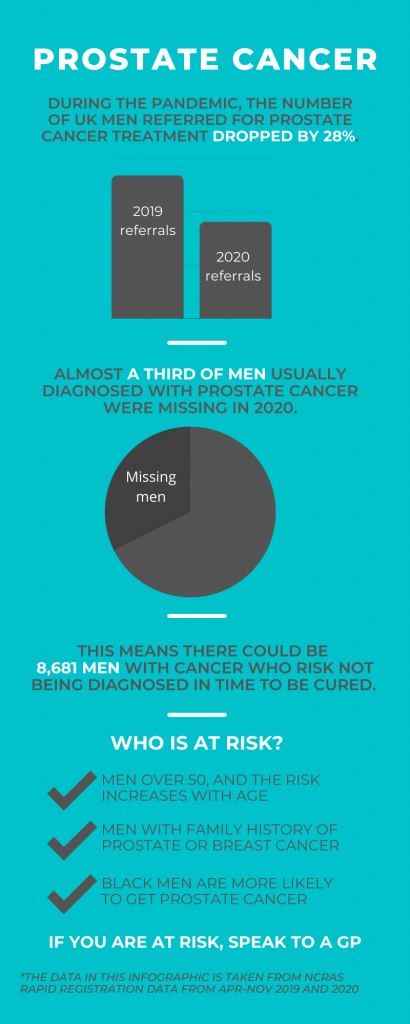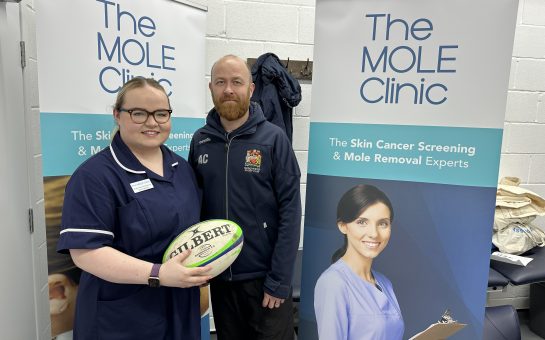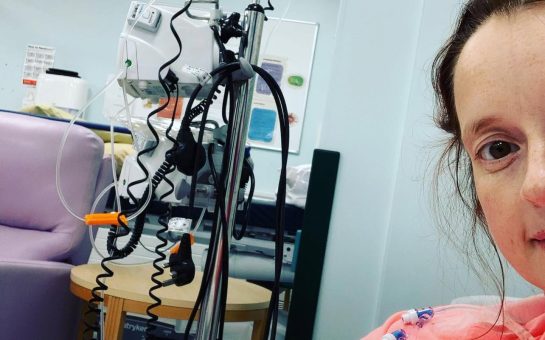North west prostate cancer referrals plummeted by 25% during the COVID-19 pandemic, prompting serious concern over thousands of ‘missing men’ who may have life-threatening cancer and risk being diagnosed too late to be cured.
According to NHS England data released last week, urgent urological referrals across England dropped by 28% (52,000 referrals) between April 2020 and January 2021.
As a result, around 8,600 fewer men started treatment for the disease in 2020 than in the previous year, a reduction of almost a third.
Prostate Cancer UK is urging the public to use and share its 30-second risk checker to help men understand their risk of the disease – which already kills more than 11,500 men in the UK annually – and help find men who should have started treatment in the past year.
Tony Collier from Timperley, Altrincham was diagnosed with terminal prostate cancer in May 2017 at the age of 60, after he noticed a pain in his groin while training for an ultra-marathon.
“I could tell by the look on the doctor’s face that there was something wrong,” said Tony.
“Waiting for the diagnosis was horrendous – I had no idea what was coming.”
Tony’s urologist told him that he could have had prostate cancer for 10 years despite having had no symptoms, and that the cancer had spread to his bones.
Tony was only vaguely aware of his risks of prostate cancer before, and was never prompted to speak to his doctor about the disease.
“Afterwards I found out that I had the right to request the PSA blood test from age 50. If I’d had the test regularly I could have been diagnosed earlier and cured.
“Instead, I face the prospect of dying before I’m 70, and not seeing my grandchildren grow up or being able to walk my daughter down the aisle.”
Tony’s doctor told him he had around two years to live, but he has responded well to treatment.
Four years on, he still runs every day and is training for an ultra-marathon and marathon-hike later this year to raise money for Prostate Cancer UK and MacMillan.
Tony is also an ambassador of Prostate Cancer UK, helping to raise awareness of the substantial drop in prostate cancer referrals and people receiving treatment during the pandemic.
He said: “It’s devastating – the thought of nearly nine thousand men walking around with cancer and not knowing it.
“I would tell all men to please do Prostate Cancer UK’s risk checker, and if you are in a high risk group, speak to your doctor about being tested.”
The PSA (prostate specific antigen) blood test is not definitive, as many men with a raised PSA level do not have prostate cancer, while some men with a normal PSA level do.
Other tests offered by GPs include a urine test to rule out a urine infection, and a digital rectal examination.
There are advantages and disadvantages of taking these tests, so Prostate Cancer UK advises men over 50 to talk to their GP about the right option for them.
Black men or men with a family history of the disease are at a higher risk and should speak to their GP when they reach the age of 45.
Angela Culhane, Chief Executive of Prostate Cancer UK, said: “Prostate cancer is the most commonly diagnosed cancer in the UK, but until these missing men are found and referrals begin to rise, many more men could be diagnosed when it is too late for them to be cured.
“Detecting cancer earlier helps save lives, but sadly prostate cancer doesn’t have a screening programme, and most men with early prostate cancer don’t have any symptoms. That’s why we want men to be informed about their risk.”
The NHS England data showed that although referral rates were improving across the country towards the end of 2020, they dropped by a further 300 (15%) in January as the country dealt with a new wave of the pandemic.
It is suspected that the decline has been caused by fewer GP visits due to restrictions and fears of infection.
Help Prostate Cancer UK find the missing men by sharing their easy-to-use online risk checker at prostatecanceruk.org/riskcheck #MenWeAreWithYou
Anyone with concerns about prostate cancer can also contact Prostate Cancer UK’s Specialist Nurses on weekdays on 0800 074 8383 or online at www.prostatecanceruk.org
Anyone experiencing symptoms, such as difficulty when urinating, are urged to speak to a doctor.




